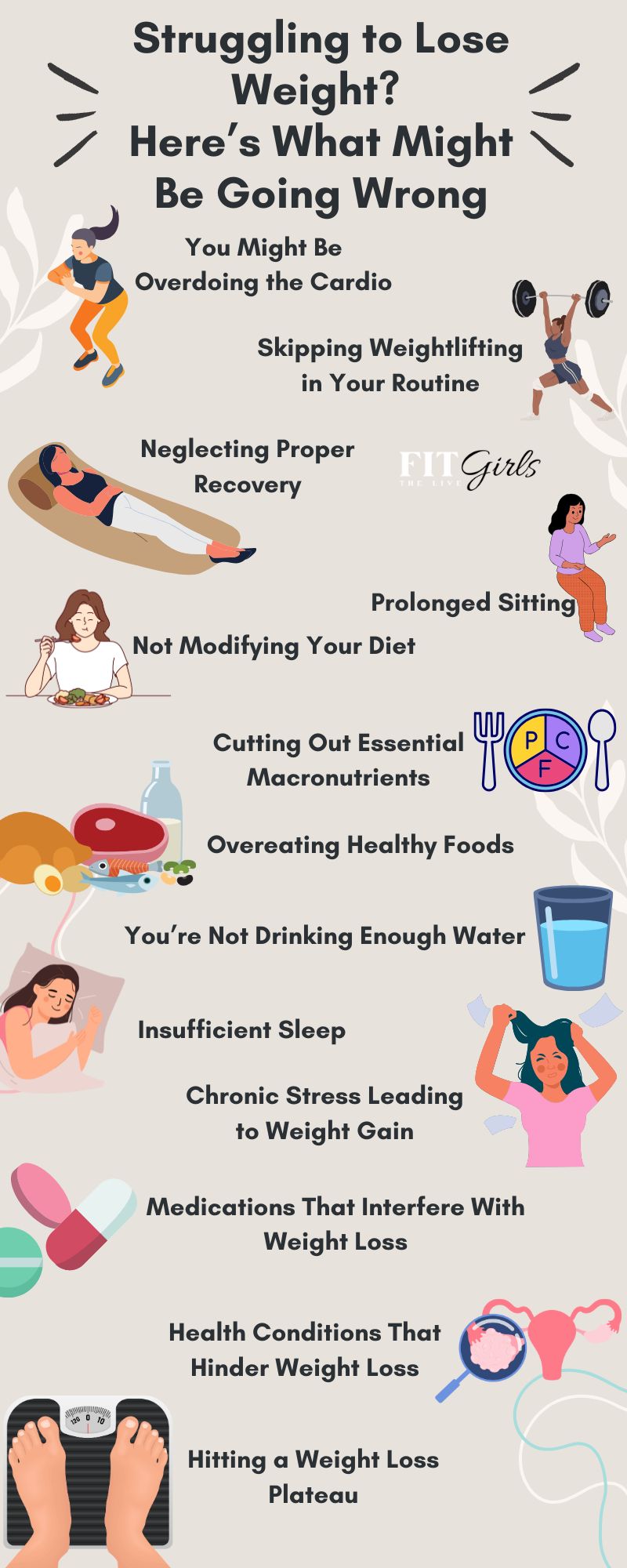
Share Post:
Weight loss can feel like an uphill battle, full of unexpected twists and turns.
If you’re finding yourself stuck, it might not be for lack of effort but perhaps because some essential aspects of your routine need tweaking.
Let’s break down some common pitfalls that could be hindering your progress.

Table of Contents
ToggleYou Might Be Overdoing the Cardio

Cardio is a pillar of any fitness regimen, lauded for its benefits for heart health, disease prevention, stress reduction, and sleep improvement. However, when it comes to weight loss, there can be too much of a good thing.
Excessive cardio might cause your body to hold onto energy reserves rather than burning fat, especially if you’re not consuming enough calories to support your energy expenditure.
According to the American Heart Association (AHA), the general recommendation is to stick to 150 minutes of moderate exercise or 75 minutes of vigorous exercise per week, with potential increases up to 300 minutes for those who feel up to it.
Skipping Weightlifting in Your Routine
Weightlifting isn’t just for bodybuilders. Incorporating strength training into your routine is crucial for boosting metabolism and building lean muscle mass, which burns more calories even at rest.
If your workouts focus solely on cardio, you’re missing out on these benefits.
Neglecting Proper Recovery

Without adequate recovery, your body doesn’t have the chance to repair and strengthen itself. This oversight can lead to decreased performance and stunted progress.
To maximize recovery, vary your workout focus daily, mixing in days dedicated to different muscle groups, light cardio, or complete rest. This strategy helps prepare your body for more intense workouts ahead.
Prolonged Sitting

Even regular workouts might not fully mitigate the health risks associated with extended sedentary behavior.
To combat this, integrate movement into your routine wherever possible. Stand periodically, take walks, or perform light exercises throughout your day to keep your metabolism active and avoid the pitfalls of a sedentary lifestyle.
Not Modifying Your Diet
Weight loss fundamentally relies on creating a calorie deficit—burning more calories than you consume. However, simply eating less isn’t enough – what you eat matters significantly.
To achieve and sustain weight loss, focus on a balanced diet with a healthy mix of macronutrients.
Limit your intake of simple sugars and saturated fats, and choose a variety of proteins and complex carbohydrates instead.
Cutting Out Essential Macronutrients
Sieh dir diesen Beitrag auf Instagram an
Ein Beitrag geteilt von Landen Quinn | Online Fat Loss Coach 🏋️🇦🇺 (@landenquinn.coaching)
Some diets promote the elimination of entire macronutrients, like carbohydrates or fats, but this can be detrimental to your health and weight loss goals. Each macronutrient serves important functions in your body, so instead of cutting them out, opt for healthier choices.
Overeating Healthy Foods
It’s easy to think that as long as the food is healthy, you can eat as much as you want. However, overeating, even healthy foods, can contribute to weight gain. Foods high in healthy fats, such as avocados and nuts, are particularly calorie-dense, making it easy to overconsume.
Pay attention to portion sizes, eat slowly, and listen to your body’s hunger cues to avoid consuming more calories than you need. Using smaller plates and bowls can also help control portions without feeling deprived.
You’re Not Drinking Enough Water
- Water is crucial not just for hydration, but also for maintaining efficient metabolic processes.
- If you’re not drinking enough water, your body can’t operate optimally, which may impede your weight loss efforts.
- Staying well-hydrated also helps in controlling hunger, as sometimes thirst is confused with hunger, leading you to eat when you actually need water.
As stated by CDC, aim to drink at least eight glasses of water a day, or more if you are active or live in a hot climate.
Insufficient Sleep
Lack of sleep disrupts hormonal balances that control appetite, often leading to increased hunger and calorie intake. Ensuring you get enough quality sleep is as important as your diet and exercise routine in achieving weight loss.
Chronic sleep deprivation may also slow down your metabolism, making it harder to lose weight even if you’re eating well and exercising.
*Try to establish a regular sleep schedule and create a bedtime routine that promotes relaxation and sleep readiness.
Chronic Stress Leading to Weight Gain

Stress triggers the release of cortisol, a hormone that can lead to fat storage, particularly around the midsection. Managing stress through techniques like meditation, deep breathing, or yoga can help mitigate its impact on your weight.
Additionally, chronic stress may lead you to seek comfort in high-calorie, sugary foods as a quick source of energy and emotional relief, compounding weight gain.
Engaging in regular physical activity can also be an effective stress reliever.
Medications That Interfere With Weight Loss
Certain medications can contribute to weight gain or make it difficult to lose weight.
If you suspect your medications are impacting your weight, discuss alternatives with your healthcare provider. Medications for conditions such as diabetes, depression, and high blood pressure are often culprits.
Health Conditions That Hinder Weight Loss
Some medical conditions, such as Cushing’s syndrome, depression, or PCOS, can significantly impact your ability to lose weight.
Addressing these health issues with professional guidance can be crucial to progressing in your weight loss journey.
It’s important to manage these conditions not only through medications, but also through tailored lifestyle changes that can help mitigate their effects on weight.
Regular follow-ups with your healthcare provider can help adjust your treatment plan as needed.
Hitting a Weight Loss Plateau
It’s normal to reach a point where weight loss slows down or stalls—this is called a plateau.
When this happens, reassessing your diet and exercise plan to introduce new variations can help reignite your metabolism and continue making progress.
Adding new types of physical activity or increasing the intensity can challenge your body in new ways, which is often enough to overcome a plateau. Also, consider whether your calorie intake needs adjusting as you lose weight, since your energy needs may have decreased.
How to Solve This
Explore Non-Surgical Weight Loss Options at Bariendo Greater Tampa
Bariendo Greater Tampa stands as a pivotal hub for Central West Florida, particularly for those seeking non-surgical weight loss solutions.
This center, in partnership with BayCare Hospital Wesley Chapel, offers a variety of procedures designed to help individuals achieve their weight loss goals without the need for surgery.
One of the key offerings is the non-surgical ESG treatment in Tampa, FL, which has garnered attention for its effectiveness and minimal downtime.
This procedure is part of a comprehensive approach that includes personalized care plans and follow-up support, ensuring that patients not only lose weight but also adopt healthier lifestyles for sustained success.
Consult Health Professionals
Seek advice from a nutritionist or dietitian to tailor a diet plan to your specific needs.
A fitness trainer can ensure you are performing exercises correctly and efficiently.
Regular medical check-ups can help identify any underlying health issues that may affect weight loss, such as hormonal imbalances or metabolic conditions.
Final Thoughts
In conclusion, successful weight loss involves more than just cutting calories or working out. Stay patient, stay consistent, and most importantly, listen to your body.
Sources
1. Heart – American Heart Association Recommendations for Physical Activity in Adults and Kids
2. CDC – About Water and Healthier Drinks
Related Posts:
- Forget HIIT—Why Low-Intensity Cardio Might Be Better…
- Dancing, Hiking, and Shopping? How to Lose Weight…
- Does Throwing Up Make You Lose Weight or Just Cause Harm?
- Leg Pain from Poor Circulation? Here Are the…
- Is Your Workout Causing Your Acne? Here's How to Stop It
- Should You Work Out While Pregnant? Here’s What Experts Say













